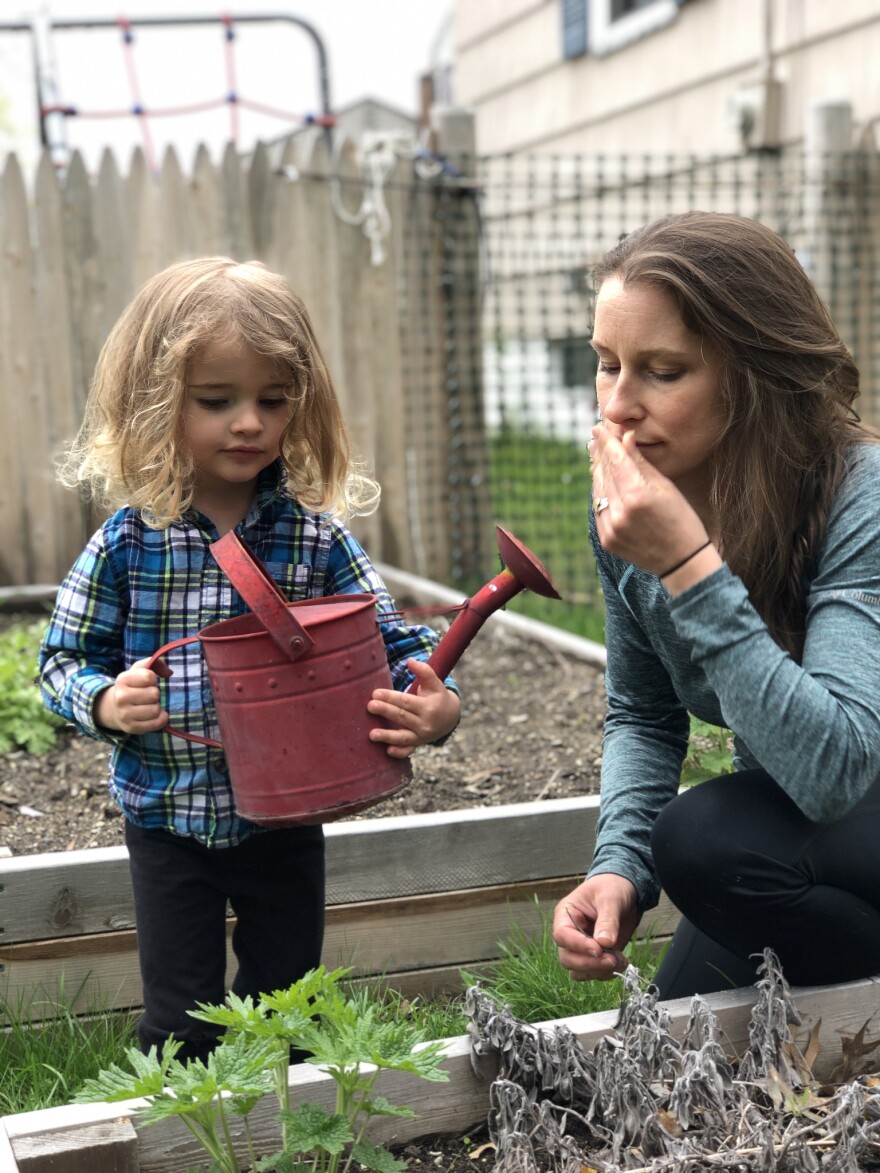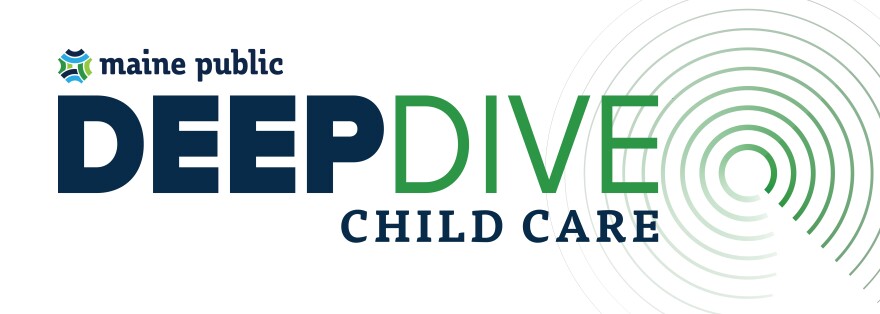One of the many challenges parents face in their search for affordable child care in Maine is that they are largely on their own. There is not much in the way of guidance, other than Google, a state-run website called Child Care Choices, and word of mouth.
It is the parents who have to track down the nearest providers, assess the quality of care, determine whether they can afford it and seek out any available subsidies.
Child care advocates say the state did not help matters by axing a decades-old system that once helped connect parents with providers. And that decision several years ago played a role in sending federal child care money earmarked for Maine to other states.
This story is part of Maine Public's Deep Dive on child care. To see the rest of the series, visit mainepublic.org/childcare.
Sarah Donat and her husband were perfectly happy with their lives in Portland, Oregon. "My kind of sense-of-self is in Oregon. The mountains, the climate, the culture of art and self-expression," she says.

She says she was also happy with the quality of child care, which was important because Donat had begun a career as an occupational therapist when her daughter, Rosalie, was born.
But two years ago, the family decided to leave Oregon and relocate to Portland, Maine. The move brought Sarah closer to her family here and in Massachusetts, but required a major adjustment to a different culture and lifestyle, as well as a cut in pay.
"We left everything to come here," Sarah says.
Almost as soon as she arrived, her job changed from part time to full time. Suddenly she had to find child care for a full five days a week.
"I was kind of hoping it would be like Oregon," she says. "I didn't realize there's less industry here. It's sparsely populated. I kind of had the assumption — maybe it's just lack of research — that it would be easier here and more affordable."
"Most parents, they needed child care yesterday," says Judy Reidt-Parker, the director of Ounce of Prevention, a national organization supporting childhood development programs. She says finding child care can be a daunting experience.
"I mean it's not all that different from trying to find the right health care provider, or the right mental health professional. You need to make sure that you and the provider have a good match. And, you know, people need help in thinking about how to ask those questions, how to feel empowered about asking those questions," she says.
Without a child care system that helps answer those questions, Reidt-Parker says parents like Donat can be quickly overwhelmed.
"How would you even know? I suppose you could Google 'child care in Maine' and see what comes up. But that's incredibly random," Reidt-Parker says.
That is exactly what Donat did.
"I first Googled 'child care, day cares in Maine.' I didn't find any banks or anything, so I called all the ones around. I visited countless — I don't even remember how many I visited in person," she says.
She did not like what she saw. The one center she did like cost $16,000 a year. All the while, Donat says, she had no idea that the state runs a website that is designed to help parents locate child care services.
"I even asked people, 'Does the state provide any direction for this?' Nobody answered yes to that question," she says.
That comes as little surprise to Reidt-Parker, who previously worked as policy analyst for the Maine Children’s Alliance, which has been sounding alarms about Maine's child care system for several years.
It began during a series of spending cuts that started in 2007 under former Democratic Gov. John Baldacci and continued for another eight years under Republican Gov. Paul LePage.
"They started little by little. It was like a death by a thousand cuts. I think 2011 was the tipping point," Reidt-Parker says.
In 2011, the Republican-controlled Legislature — with votes from Democrats — passed a budget that sharply reduced funding in a variety of initiatives, including a $2 million cut in child care spending.
LePage had promised cuts in state government, ridding it of what he called wasteful or ineffectual programs.
The next year, the state ended contracts with what were known as resource and referral centers, regional agencies that provided development training for child care providers and also helped parents find care and navigate the subsidy programs.
"They were the glue for a community," says Lori Moses, director of the Catherine Morrill Day Nursery in Portland.
Moses has been working in child care for more than three decades. She recalls how the staff at the eight referral centers would meet with parents in person, fielding questions they might have about providers.
"What training do they have? What's your turnover? And there's the facility. There's the curriculum. Is there transportation? Is it on a bus route? Do they offer meals? Do they have pets, because if you have allergies, that won't work. What are the ages you serve?" Moses says.
Moses says eliminating the resource centers means parents have to rely on a website — if they can find it — and an 800-number.
"And now there's no personal connection whatsoever," she says.
And the data on the state website are not comprehensive because the resource centers were responsible for collecting and reporting it to the state.
Every year the organization Child Care Aware America publishes a state fact sheet that shows the information states include on their search website.
In 2018, more than 40 categories on Maine's fact sheet were listed as "NR," or not reported, from space to program availability.
Why the missing information? Because the now-eliminated resource centers were responsible for collecting and reporting it to the state, Reidt-Parker says.
She says the state's move to cut roughly $1 million in annual funding for the resource centers contributed to a loss of $4 million in annual federal matching funds designated for Maine to provide child care subsidies for low- or moderate-income parents.
"Yeah, the other states got Maine's money. That's absolutely true," Reidt-Parker says.
In fact, every other state but Maine and Nebraska spend on referral centers to help trigger the matching funds.
A spokesperson from the state Department of Health Human Services says the Mills administration has a plan to once again utilize the federal matching funds. That plan does not include restoring the referral centers, which have effectively been replaced by the website and 800 number.
Tara Williams, director for the Maine Association of Education of Young Children, says the referral centers were not perfect — they were designed to cover all 16 Maine counties and administering them could be difficult — but that losing them has broken a link between parents and providers, forcing the latter to become a de facto referral service.
"I think that's how a lot of them are feeling, like they're carrying the burden of trying to help parents find resources," she says.
Donat did ultimately find child care for her daughter after a home provider messaged her on Facebook.
Sarah's mom, who has just arrived at her house, drives up from Boston twice a week to help out so that Sarah can continue to work.
Still, she says there seems to be little correlation between affordability and quality in Maine's child care system, and says she questions her decision to leave Oregon.
"I don't think moving to Maine was the best move for my family. I don't. It's been really, really hard," she says.
Maine Public’s Deep Dive: Childcare in Maine is made possible, in part, by the John T. Gorman Foundation and United Way's Women United.


